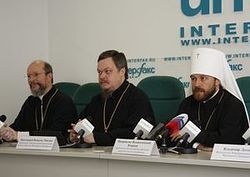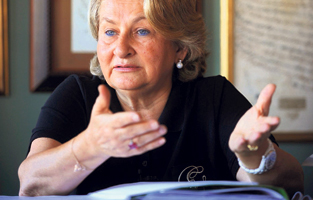
They're well-paid by western, mainly American charity funds. But not all the organizations are paid by American funds. They granted only those groups which support them who's needed. If an organizaton defends the rights of them, who isn't needed, e.g. Latvian Committee defending the rights of Russians or Russian-speaking people living in Latvia – it's not granted. Such organisations are called... “Communist”! (O. A. Popov, “Moskva”, #1, 2004,
http://www.moskvam.ru/).
It's not so necessary for managers of American funds to announce their preferences publicly – Russian human rights know by theirselves who “needs or needn't defense”. For example, the Chairman of International Helsinki Federation (IHF) L. M. Alekseyeva “knows” them. She and the rest of the leaders of IHF advised Serbian human rights activists in an open letter not to blame NATO bombings, even at the time when NATO bombs had been dropping on their heads (
http://www.ihf.org/). But what should she do if six of the ten donors of IHF were the “charity” funds managed by the governments of the countries–members of NATO? Moreover, American Human Rights Watch financed by George Soros, collecting “materials on genocide and ethnical sweeps” in Bosnia and Kosovo is a member of this International Helsinki Federation. And George Soros himself is a member of the Board of Directors of IHF.
In this article the goals and motives of American funds to grant Russian non-governmental organizations (NGO) including human rights organizations are discussed. There is also a brief reference to the history, “philosophy”, annual budgets and leaders of some big American funds which traditionally granted Russian human rights organizations.
CHARITY FUNDS – WHO NEEDS THEM?
American charity funds may be classified as big (the Ford Foundation with its annual budget of 598 million dollars of grants and donations) and (or) small (J. M. Kaplan Fund with a budget of $ 6,9 million).
You may divide charity funds according to the type of corporations which invest them into “industrial” (the Ford Foundation) and “financial” (the Soros Foundations Network). They also may be “liberal” (e.g. managed by Soros) or “conservative” (e.g. Scaife Foundations), financing “neo-cons”; of a “general type” or “special”, financing only one of the spheres (only defense of human rights or preservation of nature.
It's also appropriate to classify “charity” funds as governmental or private. The majority of them are, of course, private. The number of private funds is, as specialists counted, more than 2000, the number of governmental ones is easy countable; it reflects American approach to financing non-commercial sphere. Originally charity funds were intended to release the government from supporting non-profitable spheres – science, art, preservation of nature, solution of the problems of homeless etc. Earliest of them were established at the beginning of XX century by Rockefeller, Carnegie and Ford and their goals lay within these spheres; their activities were aimed at solving interior problems.
Joan Roelofs, a well-known researcher of charity funds called the three reasons of establishing funds and investing them the capitals of American billionaires (Joan Roelofs, “Foundations and Public Policy: The Mask of Pluralism”, SUNY Press, Albany, Feb. 2003). The first reason was purely financial – decrease of income that causes decrease of income tax. The second – to create an instrument for permanent influence on social-cultural atmosphere of the society and by means of that to enforce their control over the society. The third – to improve their image that is very important in terms of competitive economy.
As co-operation between the government and big business had been intensified and American political-economical elite had been formed, it became nesessary to create a neutral structure which businessmen, power structures and academician world could interact within. Private (non-governmental) and non-commercial organizations (NGO) became such structures; among them financial organizations played an important role in solving a number of national problems.
The need of establishing governmental funds occurred only when the solution of national geopolitical problems called for a coordinated governmental policy and control of both leading American parties – Democratic and Republican. Such a situation occurred after the World War II in view of forming a “communist” world leading by the Soviet Union.
American establishment was set a number of tasks depended on antagonism between the two superpowers – the USA and the USSR – as different civilisation systems:
- financing organizations, parties and movements opposing “socialism” and “nationalism” (patriotic movement)
- spreading the ideas and concepts of “open society” by the means of establishing and financing educational systems, schools, “liberal” press and TV
- creating “non-commercial” sphere, i.e. non-governmental organizations (NGO), which would gradually take charge of cultural, educational, social, charitable functions of governmental institutions. As a result, the society (its legitimate and legislative bodies) would lose control over this sphere. So the conditions of civilisational transformation of the Russian Nation would be created; it causes the loss of its identity and definitive turning into a source of raw materials of the “golden billion”.
- forming a “civic society” upon a western model on the basis of liberal and cosmopolitan human rights ideology
- establishing and financing schools and universities to train lawyers and social workers; revision of existing educational programs, drawing up new laws
- struggle against xenophobia, anti-semitism and Russian chauvinism, against infringing upon rights of non-traditional confessions.
You see that all above mentioned supposedly have nothing common with CIA. But even Central Intelligence Agency now isn't the same as in 50s – 60s. “Co-operation with respected and prestigious foundations lets CIA finance programs, influencing youth groups, universities, publishers and other private institutions, including human rights organizations with practically infinite sums” – we quote the materials of the hearings of the Congress on activities of CIA in 1976. Now funds are considered “the best cover of financial expenses...” Another information from the same materials of the hearings corroborates that almost 50% of “700 grants of the main American funds spent on international projects” were financed by CIA.
THE MOST “POPULAR” IN RUSSIA AMERICAN FUNDS
What western funds (including American ones) are engaged in “civilizational” transformations in Russia? To answer this question it's nesessary to know who finances Russian non-commercial sphere (in particular, human rights organizations). It's impossible to investigate the sources of all grants received by Russian human rights organizations because some of them often don't report who is their sponsor (donor), and what sum they were granted.
Let us choose the two best known metropolitan human rights organizations – Moscow Helsinki Group and “Memorial” and the two provincial ones – Perm Human Rights Center and Ryazan branch of “Memorial”.
Here are ALL the funds financing Moscow Helsinki Group:
- Liberty Road (governmental, the Embassy of Switzerland in Russia)
- Department for International Development (governmental, GB)
- European Commission (governmental, EU)
- Ford Foundation (private, USA)
- MacArthur Foundation (private, USA)
- MATRA (governmental, the Embassy of Netherlands in Russia)
- National Endowment for Democracy (NED) (governmental, USA)
- Open Society Institute (private, George Soros, USA)
- UK Foreigh Ministry
- United States Agency for International Development (USAID) (governmental).
This shows that NO Russian organization is among the donors of Moscow Helsinki Group. But seven of them are the governmental structures of the countries-members of NATO (except Switzerland). Now you can imagine what sort of policy is conducted by this human rights group which is financially independent from Russian government but financially dependent on governments of NATO countries.
In the list there are five American foundations: three of them are private (Ford Foundation, MacArthur Foundation and Open Society Institute), two – governmental (National Endowment for Democracy (NED) and USAID).
Here are the main donors of Moscow “Memorial” (some of minoritary donators, such as Edward Klein etc. aren't worth to be mentioned): Open Society Institute (George Soros), Ford Foundation, NED, Henry M. Jackson Foundation, Bradley Foundation and Guggenheim Foundation (USA).
Perm Center is financed by foreigh funds – Ford Foundation, Open Society Institute, Eurasia Foundation (George Soros), Henry M. Jackson Foundation, International Research and Exchange Council and G. Kennan Institute (USA). Worth to be mention Russian sponsors of Perm Human Rights Center are the administrations of Perm and Perm Region, LUKoil-Perm Company and Motovilikha Plant.
Ryazan human rights activists' foreign sponsors are Ford foundation, NED, Institute for Democracy in East Europe (USA), Open Society Institute, Eurasia Foundation, Freedom Path (the government of Switzerland) and the government of Netherlands. The only Russian organization financing Ryazan “Memorial” is a human rights group “For Civic Society” granted by the same Ford Foundation and NED.
So, the “leaders” in financing Russian human rights organizations are private charity funds – Ford Foundation and Open Society Institute, and governmental National Endowment for Democracy (NED).
“INDUSTRIAL” FUNDS
Ford Foundation is probably the biggest charity fund in the USA. It was founded by Henry Ford, an automobile industry tycoon in 1930s, but after the World War II it lost connection with him and by now have been managed by the Board of Trustees. It was the first of funds to join the “cold war”. In 1952-54 Richard Bissel was its director, later he became a deputy of the director of Central Intelligence Agency (CIA) Allen Dulles. Then John McCloy, a former deputy Secretary of Defense, a former President of World Bank, a former Chairman of Chase Manhattan Bank became the director of Ford Foundation. It was him who created a special department within the Foundation to co-operate with CIA...
After the well-known denunciations of 1960-70s Ford Foundation began acting more flexibly and warely. Former leaders of CIA and its departments no more held leading positions at the Board of Trustees. From 1996 Susan Berresford has been holding the position of the President of the Board of Trustees of the Foundation. She is a member of the Council for Foreign Relations and also a member of so-called Trilateral Commission in which leading politicians, economists and financiers of capitalist world took part (Russian members – S. A. Karaganov and G. A. Yavlinsky).
The board of Trustees of Ford Foundation consists of 16 members including the presidents of the biggest American corporations such as Xerox, Alcoa Inc., Coca-Cola Co., Rock Creek Co. (an investment and insurance company, an affiliate of well-known Carlyle Group). There are the presidents of the biggest American universities and well-known lawyers among the leaders of the Foundation.
As to concrete participation of Ford Foundation in the life of Soviet people, let's quote
www.fordfound.org/: “From 1950 Ford Foundation began to support projects oriented to the Soviet Union and Eastern European countries. From 1950 to 1988 about $ 60 million had been granted to analyze key problems of interrelations between East and West, defending freedom of speech, cultural pluralism and human rights. In 1989 the Board of Trustees of the Foundation took a decision to support directly (!) progressive organizations in the Soviet Union, Poland and Hungary (later in Czechoslovakia) to precipitate the process of democratization and economical reforming of these countries. In 1989-1994 about $ 30 million had been granted to work out these problems”.
According to my calculations, in 2001 Ford Foundation financed 21 Russian Human Rights organizations with a total sum of about 5 million dollars. Moscow “Memorial” received the biggest grant to buy a building for its headquarters in the center of Moscow. “Memorial” was also granted with $ 1,5 million for its investigations. Other organizations were financed with smallest sums:
- Moscow Helsinki Group – 70.000 dollars
- Helsinki Human Rights Foundation – 100.000 dollars
- Perm Center – 140.000 dollars
- International Human Rights League – 100.000 dollars
- Human Rights Center “Memorial” (the same, but granted for other purposes) – 400.000 dollars
- Non-governmental Committee on Human Rights (Krasnoyarsk) – 30.000 dollars
- Independent Council for Legal Examination – 116.000 dollars.
In 2002 total sum of grants was reduced (from $ 850 million to $ 590 million), but in Russia 17 organizations including the same “Memorial” and International Helsinki federation (IHF) received grants of Ford Foundation.
The activities of MacArthur Foundation are highly intensive in Russia. In January, 2003 this foundation “announced financing of development and reinforcement of regional human rights organizations' network” in 13 cities of Russia. For example, one of these grants ($ 140.000) was intended to finance Perm non-governmental Center for Supporting Youth Democratic Initiatives to provide legal aid to young men “refusing military service for religious and moral reasons”. It's easy to realize that these “moral reasons” not to serve in the army can appear in minds of many young men, espesially if they know that an American philanthropic organization with its annual budget of $ 175 million will plead for them.
FINANCIAL AND INVESTMENT COMPANIES' FUNDS
Russian human rights activists receive a powerful backing from those economical and political structures which are interested in creation in Russia favorable conditions to carry out non-controlled by the government financial and currency speculations. In the first place – from traditionally liberal and cosmopolitan transnational Jewish financial capital granting such organizations as Human Rights Watch, Amnesty International, International Helsinki Federation and International Human Rights League. Cosmopolitan by nature, Jewish speculative capital is more than others interested in economical and political globalization and creation of international and transgovernmental institutions restricting sovereignty of nations and giving them an opportunity for free circulation of their capitals over the whole world including Russia.
To let the reader understand what money and, accordingly, what scale of “operations to create conditions” is mentioned, we'll cite the materials of the analysis of American press and Internet information: about 20 % of 450 richest people of the world having more than $ 1 billion of personal capital are the speculators who had gained their riches in financial and investment spheres. Their total personal capital is more than 200 billion dollars. As to their finance capital managing by bankers-billionaires, it is estimated at dozens of trillions dollars.
It's necessary to mark Open Society Institute of George Soros, an American billionaire that often tries to look like a “benefactor” and a “philanthropist”. Created by him worldwide (especially in Europe and former Soviet republics) network of organizations has absolutely definite purposes – creation of social and political structures of future “open society”, the dream of George Soros. In Yugoslavia these human rights organizations and so-called “civic groups” had been the centers of forming and consolidation of anti-governmental parties and structures which played the key role in organization of the putsch that lead to overthrow of the government of Slobodan Milosevic, to liquidate the rest of the social state and to integrate Serbia politically into so-called “western community”.
The goals of Soros foundation in Russia were not long ago described by fired (by the words of Soros, for collaboration with B. A. Berezovsky) biologist Alexander Goldfarb, the manager of Russian branch of the Foundation, who had emigrated from the Soviet Union at the end of 70s: “I had been worked with George for almost ten years; I had spent $ 130 million of his money for charitable projects intended to support reforms in Russia and to relieve transformation of a communist dictature into liberal democracy, to transform closed society into open...” (“The end of the belle epoque”,
www.grani.ru/). I.e. the goal of charity of the billionaire is not to support Russian science and education (as propagandized by its liberal heralds) but to support civilizational transformations in Russia: creation of western-type “liberal democracy” and non-government-controlled market economy (open society).
Being well educated and understanding the key role of information technologies and science in modern world George Soros bent his finances and every effort to the institutes where future elite of the cosmopolitan “open society” is formed. From $ 56 million invested in Russia in 2000, Soros spent $ 18 million to create and support controlled by him information network; $ 9,5 million was granted the development of “right' educational systems; $ 5 million – to support “liberal” newspapers and TV; $ 4,5 million – to support cultural development etc. ...
The book published in 1990 written by George Soros is named “Opening the Soviet System”. In it Soros stated his political principles and the strategy of creating in “closed”, i.e. “non-western” countries structures that would assist transnational financial corporations in their speculative operations.
The ultimate aim of George Soros is the creation of “the coalition of open societies that will take upon itself the functions of UN and will turn the General Assembly into the true legislative power supporting international law” (quoted from the address of George Soros to the session of the Council for Foreigh Relations of the US Congress, December 10, 1998).
GOVERNMENTAL FUNDS
The most popular among Russian human rights activists “governmental” fund is National Endowment for Democracy (NED). It was established by the President of the USA Ronald Reagan in 1983 with its annual budget of 30 million dollars. NED formulated its mission: “to support establishing and development of democracy worldwide”.
There are 26 members at the Board of Directors of NED: congressmen, businessmen, former politicians. I'll list some of their names: Vin Weber, the Chairman of the Board of Directors of NED, a former congressman, now the Vice-president of Clark and Weinstock Bank; Gen. Wesley Clark, a former Commander-in-Chief of NATO, who had led NATO agression against Yugoslavia; Ralf Gerson, a billionaire, the President of Guardian International Corp.; Frank Carlucci, a former Secretary of Defense, now the President of Carlyle Group (Investment); Morton Abramowitz, a former Reagan's advisor, now the Chairman of International Crisis Center (ICC) and Lee H. Hamilton, a former senator, now a member of the Presidential National Security Council.
The member of the Board of Directors of NED Julie Finley, the founder of US NATO Committee and the Chairman of the Project on Transitional Democracies has been working in NED for many years. This Project, realized under cover of NED, strives for “acceleration of reformation processes” in former socialist countries and “reduction of terms of integration of these countries into EEC and NATO”. Within this Project NED financed Yugoslavian anti-governmental youth organization “Otpor” (in 2001 NED granted “Otpor” with 220 000 $) and regularly conducted seminars and other organizing measures for its members. I would remind you that “Otpor” grour took the main part in preparing and conducting putsch in Serbia (October 5, 2000) that caused the dismissal of Yugoslavian President Slobodan Milosevic.
The purpose of financing Russian “grant-eaters” (the term was offered by Rostov human rights activist E. V. Finkov) (
www.rrpoi.narod.ru) was expressed clearly by the leaders of NED: “to help receivers of our grants in their struggle against authoritarian tendencies and for more freedom and openness”. According to this leading instructions in 2000 NED granted 38 Russian non-governmental organizations with total of about 1 300 000 dollars. Just less than a half of this sum, 600 thousand $, was granted to support 16 human rights organizations and publications. For example, to support frankly anti-Russian and pro-American “Express – Khronika” weekly edition (A. P. Podrabinek) NED granted 70 thousand dollars. “Fond Zaschity Glasnosti” (Foundation for Defense of Glasnost”, Sergei Grigoryantz) was granted with 40,7 thousand $ “to publish several books on freedom of the press” in Russia. At the same time only 65 thousand dollars were granted to support Chechen refugees in Ingushetia and Russian migrants in Central Russia.
In 2002 NED granted 33 Russian human rights organization with total sum of about 1,4 million dollars. Among these grants – 36,5 thousand $ for the Center for Development and Human Rights “to estimate the draft laws from the standpoint of human rights defense and to work out the recommendations how to answer effectively to these laws”. It's evident that American congressmen highly attended to problems connected with compulsory military service in Russia.
CONCLUSION
By force of “inclusion” of Russian human rights groups into the “net” woven by American (in the main) organizations, there's no reason to be surprized when you hear that many Russian human rights activist considered themselves members of world (it's more correct to say “western”) human rights movement. They conduct a “human rights policy” which doesn't contradict the one of their western “fraternal” organizations and which is shared by leaders of funds financing Russian human rights activists.
Dependence of human rights movement from western funds and institutions that finance it causes subordination of human rights principle to concrete political goals of western powers, in particular, USA. Some Russian human rights activists understand this. A. O. Smirnov (Kosterin), a human rights activist who had already been cited by me before, wrote: “the West invested in our democracy for its own purposes. This investment is long-term but profitable – to remove the Evil Empire from the map of the world, to civilize it for troubleless life, business and policy of the West” (
www.hro.org/ngo/research/). For this purpose it's necessary to make it weak-willed, not dangerous and spiritually crushed. This has only one meaning – to destroy it.
Oleg Popov
26 / 01 / 2005

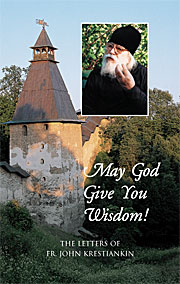
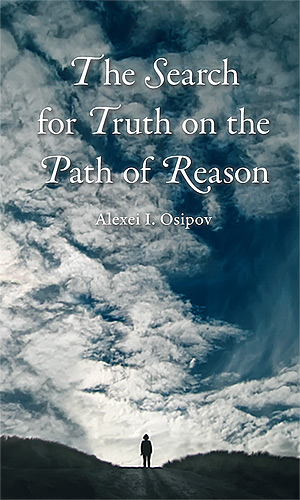
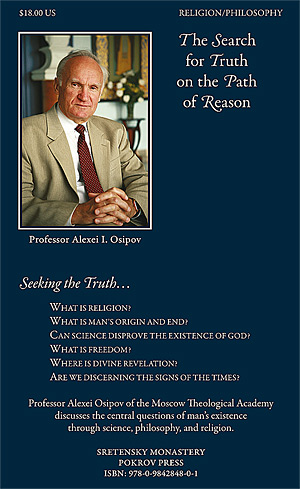
 They're well-paid by western, mainly American charity funds. But not all the organizations are paid by American funds. They granted only those groups which support them who's needed. If an organizaton defends the rights of them, who isn't needed, e.g. Latvian Committee defending the rights of Russians or Russian-speaking people living in Latvia – it's not granted. Such organisations are called... “Communist”! (O. A. Popov, “Moskva”, #1, 2004,
They're well-paid by western, mainly American charity funds. But not all the organizations are paid by American funds. They granted only those groups which support them who's needed. If an organizaton defends the rights of them, who isn't needed, e.g. Latvian Committee defending the rights of Russians or Russian-speaking people living in Latvia – it's not granted. Such organisations are called... “Communist”! (O. A. Popov, “Moskva”, #1, 2004, 





